Here's why Twitter is about to get way less useful for everyone
Opinion: Elon Musk wants companies to pay up

Elon Musk's efforts to squeeze as much money as he can out of all Twitter users small and very big is leading to an exodus of not just site members, but on-platform utility.
No one can or should argue that Twitter was in excellent shape when Elon Musk bought it for $44 billion (and probably overpaid by a lot). It was bloated, full of trolls, and probably burning through cash, but at its core, Twitter was still fundamentally useful to a broad swath of the online populace.
The value drain started when Musk stripped Legacy Blue Verified checks from millions of users, including celebrities and major cultural figures. Instead of paying a monthly fee, many, who felt hung out to dry by Musk, walked (possibly in recent days, to Bluesky).
Now, though, some companies and services are also rethinking their Twitter presence as one of Musk's latest cash-grabbing ideas goes into effect: radically increasing the price for Twitter API access and essentially doing away with the free access level.
Starting February 9, we will no longer support free access to the Twitter API, both v2 and v1.1. A paid basic tier will be available instead 🧵February 2, 2023
An API is an application programming interface that can handle the interaction between two disparate services or platforms.
Access to Twitter APIs allowed companies to tap into Twitter's wealth of real-time data to build on-and-off-platform services that could curate tweets, analyze traffic from the platform, track sentiment, or even automate tweets based on certain external data parameters.
Up until recently, most firms could get away with using the free Standard tier of API access but now, as Wired reported last month, these same companies might be asked to pay as much as $42,000 per month.
Sign up for breaking news, reviews, opinion, top tech deals, and more.
Even though Twitter enacted the change late last month, the dominoes of reaction are just starting to fall.
I've already noticed some companies pulling back from integrating Twitter analytics as part of their data package (Parsely Analytics, which I use, is one) but consumers are also starting to feel the impact.
Earlier this week, New York City's Metropolitan Transit Authority opted to turn off all its real-time service alerts on Twitter which were powered by, you guessed it, access to Twitter APIs. As Bloomberg reported, the reasoning was simple: almost $50,000 a month was too much to pay for the privilege.
Twitter bots that provide live updates on Twitter are also likely to disappear. In some cases, Twitter will shut them down if they refuse to pay for Twitter API access.
One such Twitter service was the Thread Reader App, which automatically rolled up and represented long Twitter threads in a single link. As of April 13, Twitter suspended ThreadApp's access.
Our App got unsuspended! Still no word from Twitter what happened and how long this will last but we’re not complainin’!April 13, 2023
There is a chance that Twitter is about to become less useful and many of these small bots that do things like automatically delete Tweets for you or, more significantly, automatically post-earthquake alerts on Twitter, could disappear as they're asked to pay for access to Twitter's services.
Even before Musk enacted his new API access rates, he was shutting down access to third-party services. The decade-old Twitter client TweetBot was forced to shut down in January after Musk unexpectedly shut off API access.
While you could make the case that free access to Twitter's data was never a good idea, trying to charge almost $50,000 a month and expecting everyone from small businesses to public services, and some small-time bots to suddenly start paying it is ridiculous.
Musk's efforts to replace the advertising dollars he drove away through a series of bad moves and strategic fumbles will likely result in a rapidly-deteriorating platform being even less useful to exactly those who Musk is desperately trying to attract to the platform.
So, if you notice one of your favorite Twitter feeds is no longer delivering that daily drip of useful information, you can probably blame Elon Musk, and if you leave Twitter because of that, well, Musk has only himself to blame.

A 38-year industry veteran and award-winning journalist, Lance has covered technology since PCs were the size of suitcases and “on line” meant “waiting.” He’s a former Lifewire Editor-in-Chief, Mashable Editor-in-Chief, and, before that, Editor in Chief of PCMag.com and Senior Vice President of Content for Ziff Davis, Inc. He also wrote a popular, weekly tech column for Medium called The Upgrade.
Lance Ulanoff makes frequent appearances on national, international, and local news programs including Live with Kelly and Mark, the Today Show, Good Morning America, CNBC, CNN, and the BBC.